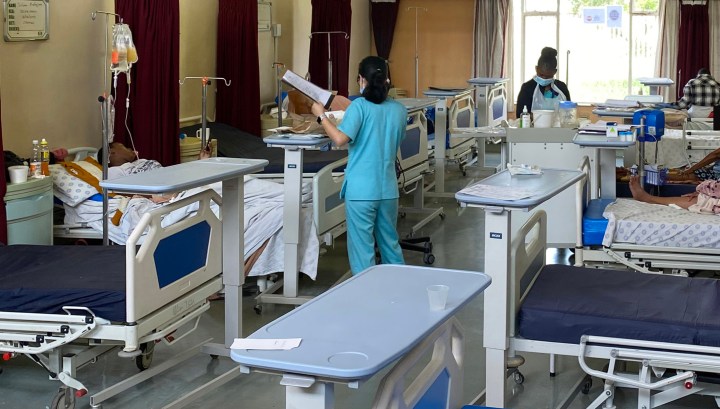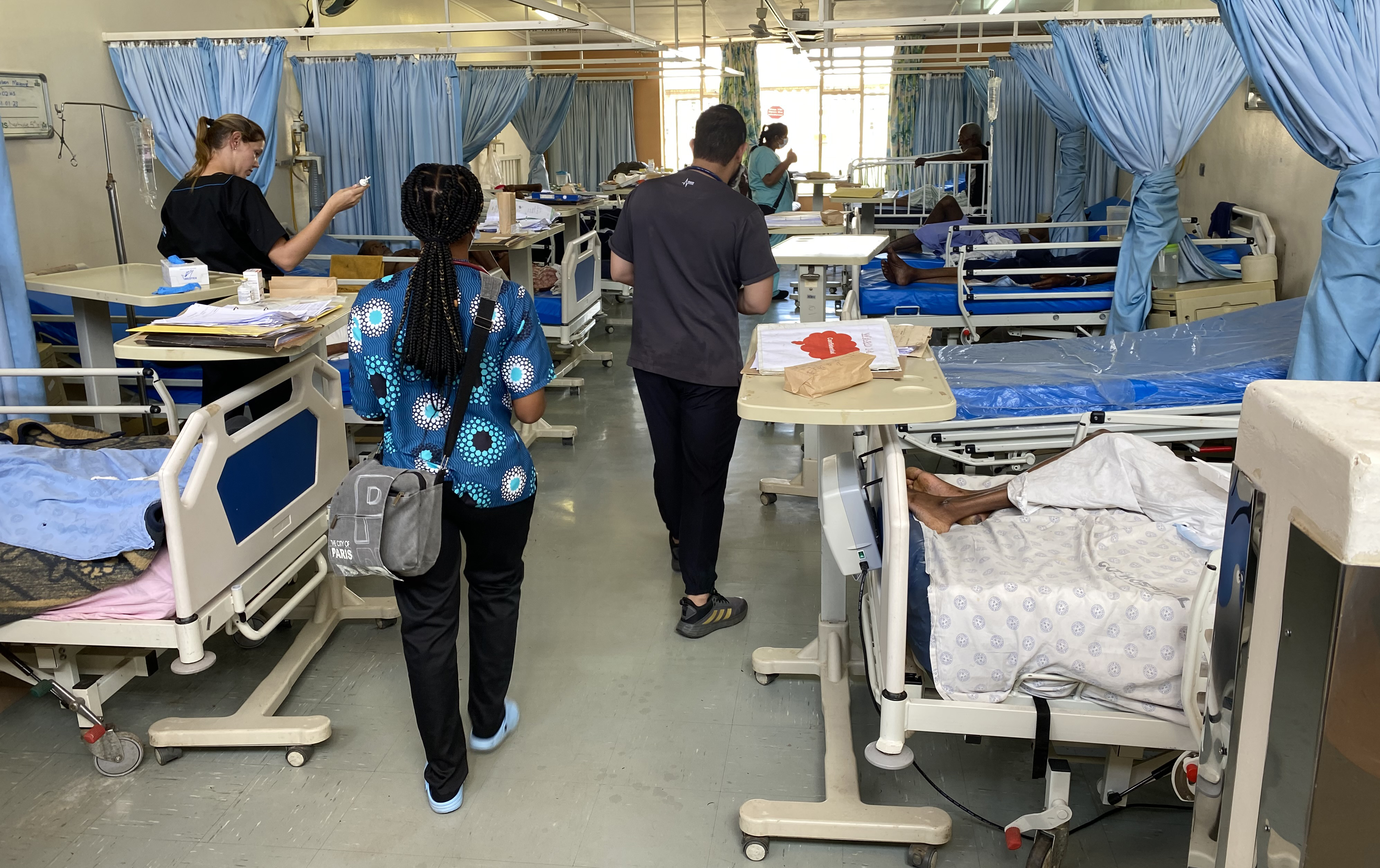VICTORY FOR COMPASSION
South Africans have heart: heroes of the public healthcare strike came from all walks of life

As public health facilities were rocked by a violent strike over the past two weeks, patients were in crisis. With only skeleton staff attending, there were not enough hands to look after the country’s most vulnerable. But then South Africans stepped up.
The government submitted a long list of the wrongs committed during the health strike to the Labour Appeal Court in its final attempt to get an interdict against essential services striking.
These included acts of violence and intimidation. In Eastern Cape, nurses reported receiving phone calls from “angels of death” who had all their personal details and threatened them to stay at home.

Nehawu members protest outside Charlotte Maxeke Hospital on March 8 2023 in Johannesburg. The health workers’ union are demanding a 10% salary hike and the strike is taking place at several hospitals around Johannesburg. (Photo: Gallo Images/Fani Mahuntsi)
There were also reports of staff being physically assaulted. Many incidents were noted in which staff were beaten with sjamboks and forcibly removed from their posts.
Doctors fear more loss of life as health workers strike set to intensify on Monday.
Furthermore, striking workers prevented the delivery of oxygen to hospitals, and blood stocks ran out in rural hospitals as deliveries were blocked.
At least two newborn babies died. A snakebite victim could not receive urgent help and thousands were barred from the help they needed.
Read in Daily Maverick: Nehawu ends strike after government sweetens its 2023 pay rise offer to public servants
But, at hospitals around the country, ordinary South Africans arrived to help. They cleaned and cooked and helped where they could. During high-conflict situations, reports emerged of nurses smuggling doctors into hospitals to look after patients. Doctors were dishing out porridge in the mornings and medicine on ward rounds.

A few nurses attend to patients at Tshepong Hospital in Klerksdorp on 7 March 2023, while Nehawu members picket outside the hospital. (Photo: Felix Dlangamandla)
More than words
Mondli Mvambi, spokesperson for the Free State department of health, has worked in the department since 2016. After the first five days of striking by trade union Nehawu and its members, Mvambi spent the weekend cleaning at Pelonomi Academic Hospital in Bloemfontein, alongside volunteers from the Red Cross Society and the parents of some patients.
“During the week, as the strike was progressing, no garbage was collected in the casualty area. Many parts of the hospital, including the wards, were filthy,” he said.
“When there’s no cleaning, you are generating infections; you are not helping your patients. You are not helping the caregivers if you keep the environment filthy, so I felt I needed to do something and I felt the citizens of our country could also do something to lend a hand.”
Striking workers locked Pelonomi’s storerooms holding cleaning materials. Other hospitals provided gloves, masks and plastic bags of different colours so volunteers could separate hospital waste safely.
“We needed to clean but we needed to do it in a safe way that does not violate the waste management procedures of the facility. You need to separate waste in a hospital,” said Mvambi. “Nurses and doctors were able to guide us in the ward on how to separate that waste.”
About his reasons for volunteering his time, Mvambi said: “As a spokesperson of the department, it is not enough for me to speak on issues that I see, to reflect on the work that has been done. It also calls me to question what I do beyond just speaking about it.”
Professor Edwin Turton, head of the department of anaesthesiology at the University of the Free State, went “above and beyond” to provide assistance during the strike, even helping to clean toilets at Pelonomi, according to Veneshree Govender, consultant anaesthesiologist for the department of anaesthesiology at the university.
“As a department, we helped out in the wards, looking after patients, administering medication. People worked in the kitchen, helped make meals, helped distribute meals to the wards. People were porters, they were cleaners, nursing staff and doctors,” said Govender.
“I think for us, as a department, patient care was paramount and at the forefront, and there was no dereliction of duty. The quality and level of care that we administered during the strike was the same as we did beforehand.”
Visit Daily Maverick’s home page for more news, analysis and investigations
Women at the forefront
Nkosikazi Nosintu Gwebindlala, chairperson of the Eastern Cape Congress of Traditional Leaders Women’s Wing, gathered her friends and members of the hospital board on which she serves to help cook and feed patients and do the washing.
“We sympathise with striking workers, but someone was needed to help patients. We were not undermining the Nehawu strike – we were just helping out as women in traditional leadership and hospital boards. All we did was cook for patients, clean up the hospitals and do laundry services,” Gwebindlala said.
“The ubuntu intervention by hospital board members and women in traditional leadership began in Madwaleni Hospital in Elliotdale and it spread to other hospitals in the province like Victoria Hospital [in Alice].
“The Nehawu strike involved nurses, general workers and support staff of the hospital, meaning there were no cooks, laundry workers; some nurses were not on duty,” added Gwebindlala said.
“You will understand in hospitals there are patients and some of them are critically ill. The hospital was updating us … and discharged those patients who were not in critical conditions, but those who couldn’t be taken home had to remain in hospital.
“Imagine you get sick, you are critically ill and you get to hospital. What do you expect in hospital? You expect to get better. You will only get better when someone takes care of you. You need your medication and you need to eat. What will you do if none of those things are available to you?
“We sympathise with the workers; we know exactly what they want. We are not undermining their strike, but someone must help patients. Women in traditional leadership heard the call to assist the patients,” she said said.
“Even today people are still calling me offering to help.”
Gwebindlala said they were doing their duty as traditional leaders and as board members of hospitals.
“These are our people. We had to help. People asked me if I was scared. But I said it was my responsibility as a leader to assist people.”
Money from debris
At the Bheki Mlangeni District Hospital in Soweto, two men with a donkey cart cleaned up the debris from tyres set alight by striking Nehawu workers. They arrived with garden spades and a homemade broom to clean up.

Two men on a donkey cart arrive at the Bheki Mlangeni Hospital to remove Tyre and other debris last week during the Nehawu wage strike. (Photo: Bheki Simelane)
“The striking workers knew not to block us. They knew we were coming to do the cleaning,” James Sefalane said.
Sefalane related how he and his friend had first gone to Chris Hani Baragwanath Hospital, but found the situation there too violent and left. But they returned later to clean up there too.
Sefalane said they would sell the burnt-out tires when the cart was full.
“We are not really making much from collecting debris, even though we gain from all of it because sometimes the strikers use logs. We remove the logs and chop them into small pieces of wood for sale at the township in Kliptown.
“We are grateful for what we are doing because it saves us from a life of crime and we can hit two birds with one stone. We make the environment clean but also make a bit of money from it,” Sefalane said.
Determined to work
On Wednesday 8 March, as the strike entered its third day, all entrances to the Witbank Provincial Hospital were closed. No medical services were provided as protesters burned tyres in front of the gates of the hospital.
One nurse, motivated by a commitment to patients, did not let this deter her from coming to work. She asked to remain anonymous.
“The strikers would come in a group, stand at the gate and from there they would enter and look for staff that were working. They weren’t hurting anyone inside, but they would drag staff members out because they wanted to make the patients suffer and have their voices heard,” she said.
As the week progressed, the protests ramped up, making it difficult for healthcare workers to enter the Witbank hospital. She stopped wearing her uniform.

Nurses attend to patients at Tshepong Hospital in Klerksdorp on 7 March 2023, while Nehawu members picket outside the hospital. (Photo: Felix Dlangamandla)
“I would wear takkies and jeans so they could not tell who I was. And, if you need to jump over the fence, you will be able to do it with this outfit,” she explained. “It is easier to run with takkies, even if you are not a marathon runner.”
The nurse said it was a scary time and staff inside the hospital would listen all the time to what was going on outside. Despite her fears, she came to work every day she had a shift scheduled.
“We have a pledge [as nurses] and I promised that my patient will be my first priority. That means total care for your patient must be your first priority, irrespective of a strike or anything. Your patient comes first,” she said.
She acknowledged that some staff members empathised with the strikers and wanted to join the work stoppage, but they had refrained from doing so. “You need to put your patient first. The strikers were putting themselves first and then patients behind because they never thought of that pledge they undertook.”
Asked if she would work if there was another strike, she answered without hesitation: “Yes, I would do the same thing. I would still go to work because the patients come first.” DM168
This story first appeared in our weekly Daily Maverick 168 newspaper, which is available countrywide for R25.





















 Become an Insider
Become an Insider
Kudos to everyone for rolling up sleeves and assuming responsibility for those vulnerable people. A pox on strikers intimidating those who exercise their right to work, especially by physical violence.
Hats off to these people. It is humbling and heart warming to read which leaves one with a renewed faith in humanity,
Pity the politicians don’t have that sense of ubuntu.